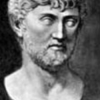Lucretius

Lucretius
Titus Lucretius Caruswas a Roman poet and philosopher. His only known work is the epic philosophical poem De rerum natura about the tenets and philosophy of Epicureanism, and which is usually translated into English as On the Nature of Things...
NationalityRoman
ProfessionPoet